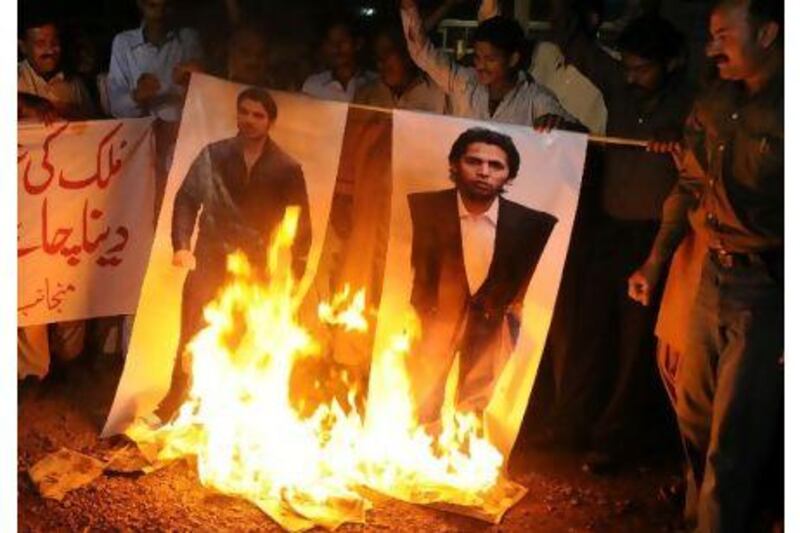We accept that sport does not exist in a vacuum. We say in many ways it reflects life. We accept that crime cannot be fully eradicated from our lives.
We know sport is populated not by aliens but by humans who live lives outside of sport. We also know crime is likelier once humans and money near each other.
It is logical, therefore, that we must accept criminal tendencies will seep into sport, flush as it is with big money and also, finally, that corruption can never be removed from cricket.
Only last year, two months before the Lord's Test between England and Pakistan, Paul Condon, the then head of cricket's anti-corruption unit, left predicting "you will never entirely eradicate fixing from cricket".
Before this, Lord Condon fought crime as the Commissioner Metropolitan Police. He knows, it is fair to say, what he is talking about.
Yet after the jail sentences of the Pakistan players Salman Butt, Mohammad Asif and Mohammad Amir, cricket has thrown a hissy fit, this logic ignored.
Much of cricket's spluttering rage has flowed on the International Cricket Council's (ICC) Anti-corruption and Security unit (ACSU).
Predictable barbs have come from predictable sources; Ian Botham and Andrew Strauss have tapped into a widespread gripe, that the body is toothless, and has spent far too much money over 10 years to do nothing.
These views are monumentally ignorant, symptomatic of the thoughtless lynch-mob mentality that collective human reaction boils down to now.
The ACSU is not a law-enforcement body. Let alone having powers to arrest, the body cannot even entrap players.
It cannot tap telephones or hack them. It cannot conduct sting operations.
When there was talk of undercover agents attempting to lure cricketers into temptation, players' bodies were outraged.
Any broadening of their remit, in fact, leads straight into civil liberty and privacy debates, neither of which cricket is equipped to handle.
What the ACSU does is create an environment whereby it is increasingly difficult to fix matches. Much of their work is done behind the curtains of public life.
Educational programmes aside, nobody hears of the many personalities they ban from attending their tournaments, the interceptions they make of potential approaches, plots foiled, players quietly sidelined, captains moved down, officials inked out.
For example, in late 2007, when some Pakistani players unwittingly attended a social function in India, where they met and received gifts from men on the ACSU radar, it prompted an ACSU visit to Lahore to warn the players of precisely what is what.
Butt, remember, was already of interest to the ACSU having been sent a notice (along with Kamran Akmal) after the 2010 World T20. And it was the ACSU that punished this trio first, completing a successful investigation and prosecution within six months.
We act now as if that entire episode, of evidence-gathering, investigation and prosecution, did not happen or was somehow, as Simon Hughes argued, feeble.
The cricketer-journalist wasn't the sole or most prominent voice, but the latest to blame the ICC for not handing out lifetime bans in Doha. That would be because it wasn't their decision.
The ICC pushed for maximum sanctions, but the verdicts and sentences were not theirs to give.
Those were given by an independent panel of very established arbitrators, not some kangaroo court.
What the ACSU also do is work with law enforcement agencies, such as Interpol, Scotland Yard and India's Central Bureau of Investigation over actions they cannot take.
Legislation being talked about in Australia and Pakistan to criminalise fixing specifically will boost this cooperation.
In some countries the ACSU's regional officers are serving officials in police forces; all have experience of law enforcement and their local network is deep and well-nurtured.
Within the narrowness of their jurisdiction, that is the best they can do.
This is not to defend the ICC; it is simply to attack ignorance though maybe it is, as one ICC official conceded, during a rare philosophical lapse, the nature of the beast: the ACSU role is only highlighted - in criticism - on days such as these.
Otherwise, they are ignored.
Now they will need to be as alert as ever, because cricket is in a mass panic. Suddenly every game is fixed, every country is at it, all players involved (Pakistanis say this with particular force, perhaps to console themselves they are not alone; consolation is also delusion).
"Now, whenever people look back on a surprising event in a game or a surprising result or whenever in the future there are surprising events or results, followers of the game ... will be led to wonder whether there has been a fix," said Justice Cooke at the trial.
Welcome world, to Pakistan (2000-2010), where allegation is evidence and paranoia the default setting.
Michael Vaughan says now, 11 years later, the 2000 Karachi Test felt "funny" (funnier he thought nothing of Old Trafford months later, where England collapsed in a heap after tea to dodgy no-balls against Pakistan).
It is the kind of mischief, in gruffer, less polished tones, we have come to expect from Sarfraz Nawaz.
Some advice (to maintain sanity more than anything): the least we owe cricket and its clean participants is faith and belief that what we see is real unless it is definitively proven otherwise. That is not just a debt, it is a principle of natural justice.
We must not deny that the ACSU finds itself in a cleaner place than in which it was born, through its doing. Cricket cannot ever be completely clean but it can fight on. The ACSU leads that fight and should begin by investigating evidence from this trial about other players.
We must begin by trusting them and the game a little more.
Follow
The National Sport
on
[ @SprtNationalUAE ]
& Osman Samiuddin on
[ @OsmanSamiuddin ]





